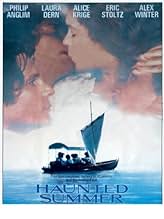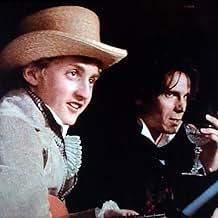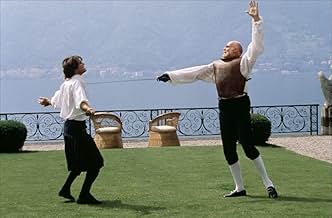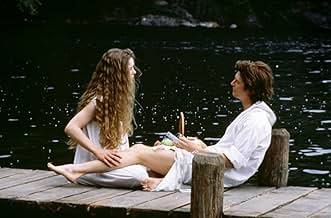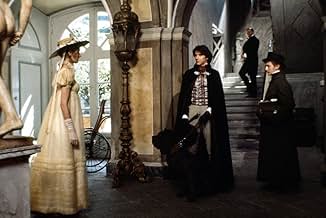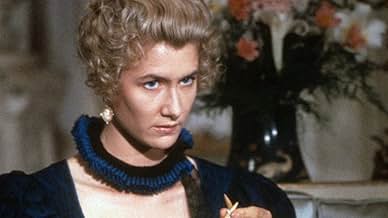In 1816, authors Lord Byron, Mary Shelley and Percy Shelley get together for some philosophical discussions, but the situation soon deteriorates into mind games, drugs and sex.In 1816, authors Lord Byron, Mary Shelley and Percy Shelley get together for some philosophical discussions, but the situation soon deteriorates into mind games, drugs and sex.In 1816, authors Lord Byron, Mary Shelley and Percy Shelley get together for some philosophical discussions, but the situation soon deteriorates into mind games, drugs and sex.
- Awards
- 1 nomination
Donald Hodson
- Rushton
- (as Don Hodson)
Giusto Lo Piparo
- Berger
- (as Giusto Lo Pipero)
Antonino Iuorio
- Carriage Driver
- (uncredited)
- Director
- Writers
- All cast & crew
- Production, box office & more at IMDbPro
Storyline
Did you know
- TriviaThe film was originally scheduled to be directed by John Huston before Ivan Passer was assigned the job.
- Quotes
Dr. John William Polidori: I have written a play. I think it quite good.
Lord Byron: Do shut up, John.
- SoundtracksAndante from String Quartet Op. 3 No. 5 ('The Serenade')
Composed by Joseph Haydn (as Josef Haydn)
Featured review
This movie which concerns the meeting of the two famous Romantic poets Shelley and Byron along with their entourages near the lake of Geneva, captures well the romantic and libertarian climate that our readings and imaginations lead us to associate with such an encounter. A true visionary company consisted by Byron and his personal physician Dr.Polidori as well as Shelley, his lover Mary Godwin, with whom she had eloped and who going latter to be his wife, and the latter's half-sister Claire are a fine team to spend something more than an hour and half with.
The characters are well developed and space and time is given to Dr.Polidori and Claire even if those were the ones that unlike the others posterity has not crowned with literary fame.Byron occupies center stage sometimes overacted by the otherwise very able Philip Anglim. He tries to keep up with his demonic image of the cursed poet as well as with that of a man who embraces the life-style of a 19nth century gentleman. Shelley is more ethereal more close to the image of Matthew Arnold of "A beautiful and ineffectual angel" although an angel occasionally prone to pranks in the expense of people that take themselves too seriously.Dr. Polidori is a sidekick to Byron, meant to suffer his ironic comments but also his lover. Claire is the sexy and liberated sister while Mary is thoughtful, commanding and introspective.
There is fine insertion of poetic extracts in the movie, very well crafted and not incongruous with the development of the plot. In the end the voice of Shelley is heard reading the conclusion of his poem "The Sensitive Plant" the meaning of which is very resonant with the content of the movie.
Costumes and scenery are charming and one thinks that he is in company with the 19nth century gentry. A very libertarian version of it actually with a tendency of long discussions over the table on the difficult topics of social justice and liberty while being served by servants in uniforms.
The personal relationships of the group are entangled to say the least but even if we allow for poetic license from the part of the director and the scenario, our sources of the real events tell us that was actually the case.
The element of the supernatural is both manifested and subverted as it is linked with nightmares and opium-produced hallucinations. But I think they fail to do justice to the moral and political problematics of Mary Shelley's Frankenstein novel, to the creation of which a text in the end of the movie refers along with the fates of the characters involved. If one watches the movie he may be left with the impression that Frankenstein is a horror story inspired by hallucinations and nightmares. It is not so, it is a story with horror elements but it is about hubris, justice, prejudice and lot of topics that where the staple of the Enlightenment along with the romantic fervor and touch that Mary Shelley added.
Inevitably the comparison with Ken Russell's film "Gothic" dealing with the same events and characters comes to mind. In my opinion and if different things can be graded this film is better or at least it is much nearer to the mental picture of the characters I have formed through the reading of their works and life-stories. The Romantics discussing and making verses by the lake is much more my piece of cake than the atmosphere of supernatural terror and licentious excess of Gothic. But this is a subjective opinion.
The characters are well developed and space and time is given to Dr.Polidori and Claire even if those were the ones that unlike the others posterity has not crowned with literary fame.Byron occupies center stage sometimes overacted by the otherwise very able Philip Anglim. He tries to keep up with his demonic image of the cursed poet as well as with that of a man who embraces the life-style of a 19nth century gentleman. Shelley is more ethereal more close to the image of Matthew Arnold of "A beautiful and ineffectual angel" although an angel occasionally prone to pranks in the expense of people that take themselves too seriously.Dr. Polidori is a sidekick to Byron, meant to suffer his ironic comments but also his lover. Claire is the sexy and liberated sister while Mary is thoughtful, commanding and introspective.
There is fine insertion of poetic extracts in the movie, very well crafted and not incongruous with the development of the plot. In the end the voice of Shelley is heard reading the conclusion of his poem "The Sensitive Plant" the meaning of which is very resonant with the content of the movie.
Costumes and scenery are charming and one thinks that he is in company with the 19nth century gentry. A very libertarian version of it actually with a tendency of long discussions over the table on the difficult topics of social justice and liberty while being served by servants in uniforms.
The personal relationships of the group are entangled to say the least but even if we allow for poetic license from the part of the director and the scenario, our sources of the real events tell us that was actually the case.
The element of the supernatural is both manifested and subverted as it is linked with nightmares and opium-produced hallucinations. But I think they fail to do justice to the moral and political problematics of Mary Shelley's Frankenstein novel, to the creation of which a text in the end of the movie refers along with the fates of the characters involved. If one watches the movie he may be left with the impression that Frankenstein is a horror story inspired by hallucinations and nightmares. It is not so, it is a story with horror elements but it is about hubris, justice, prejudice and lot of topics that where the staple of the Enlightenment along with the romantic fervor and touch that Mary Shelley added.
Inevitably the comparison with Ken Russell's film "Gothic" dealing with the same events and characters comes to mind. In my opinion and if different things can be graded this film is better or at least it is much nearer to the mental picture of the characters I have formed through the reading of their works and life-stories. The Romantics discussing and making verses by the lake is much more my piece of cake than the atmosphere of supernatural terror and licentious excess of Gothic. But this is a subjective opinion.
- georgioskarpouzas
- Mar 14, 2011
- Permalink
- How long is Haunted Summer?Powered by Alexa
Details
- Release date
- Country of origin
- Languages
- Also known as
- Schwarzer Sommer
- Filming locations
- See more company credits at IMDbPro
Box office
- Budget
- $6,000,000 (estimated)
- Gross US & Canada
- $9,911
- Opening weekend US & Canada
- $4,726
- Dec 18, 1988
- Gross worldwide
- $9,911
- Runtime1 hour 46 minutes
- Color
- Sound mix
Contribute to this page
Suggest an edit or add missing content


